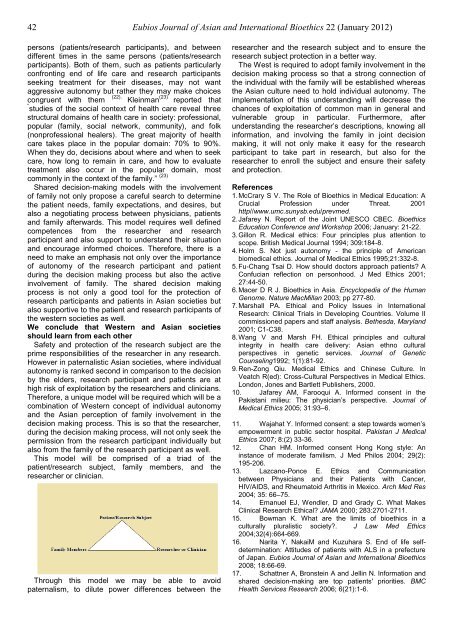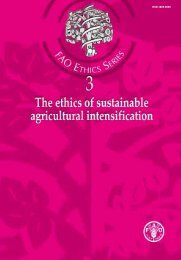Eubios Journal of Asian and International Bioethics - Eubios Ethics ...
Eubios Journal of Asian and International Bioethics - Eubios Ethics ...
Eubios Journal of Asian and International Bioethics - Eubios Ethics ...
You also want an ePaper? Increase the reach of your titles
YUMPU automatically turns print PDFs into web optimized ePapers that Google loves.
42 <strong>Eubios</strong> <strong>Journal</strong> <strong>of</strong> <strong>Asian</strong> <strong>and</strong> <strong>International</strong> <strong>Bioethics</strong> 22 (January 2012)<br />
persons (patients/research participants), <strong>and</strong> between<br />
different times in the same persons (patients/research<br />
participants). Both <strong>of</strong> them, such as patients particularly<br />
confronting end <strong>of</strong> life care <strong>and</strong> research participants<br />
seeking treatment for their diseases, may not want<br />
aggressive autonomy but rather they may make choices<br />
(22).<br />
congruent with them Kleinman (23) reported that<br />
“ studies <strong>of</strong> the social context <strong>of</strong> health care reveal three<br />
structural domains <strong>of</strong> health care in society: pr<strong>of</strong>essional,<br />
popular (family, social network, community), <strong>and</strong> folk<br />
(nonpr<strong>of</strong>essional healers). The great majority <strong>of</strong> health<br />
care takes place in the popular domain: 70% to 90%.<br />
When they do, decisions about where <strong>and</strong> when to seek<br />
care, how long to remain in care, <strong>and</strong> how to evaluate<br />
treatment also occur in the popular domain, most<br />
commonly in the context <strong>of</strong> the family.” (23)<br />
Shared decision-making models with the involvement<br />
<strong>of</strong> family not only propose a careful search to determine<br />
the patient needs, family expectations, <strong>and</strong> desires, but<br />
also a negotiating process between physicians, patients<br />
<strong>and</strong> family afterwards. This model requires well defined<br />
competences from the researcher <strong>and</strong> research<br />
participant <strong>and</strong> also support to underst<strong>and</strong> their situation<br />
<strong>and</strong> encourage informed choices. Therefore, there is a<br />
need to make an emphasis not only over the importance<br />
<strong>of</strong> autonomy <strong>of</strong> the research participant <strong>and</strong> patient<br />
during the decision making process but also the active<br />
involvement <strong>of</strong> family. The shared decision making<br />
process is not only a good tool for the protection <strong>of</strong><br />
research participants <strong>and</strong> patients in <strong>Asian</strong> societies but<br />
also supportive to the patient <strong>and</strong> research participants <strong>of</strong><br />
the western societies as well.<br />
We conclude that Western <strong>and</strong> <strong>Asian</strong> societies<br />
should learn from each other<br />
Safety <strong>and</strong> protection <strong>of</strong> the research subject are the<br />
prime responsibilities <strong>of</strong> the researcher in any research.<br />
However in paternalistic <strong>Asian</strong> societies, where individual<br />
autonomy is ranked second in comparison to the decision<br />
by the elders, research participant <strong>and</strong> patients are at<br />
high risk <strong>of</strong> exploitation by the researchers <strong>and</strong> clinicians.<br />
Therefore, a unique model will be required which will be a<br />
combination <strong>of</strong> Western concept <strong>of</strong> individual autonomy<br />
<strong>and</strong> the <strong>Asian</strong> perception <strong>of</strong> family involvement in the<br />
decision making process. This is so that the researcher,<br />
during the decision making process, will not only seek the<br />
permission from the research participant individually but<br />
also from the family <strong>of</strong> the research participant as well.<br />
This model will be comprised <strong>of</strong> a triad <strong>of</strong> the<br />
patient/research subject, family members, <strong>and</strong> the<br />
researcher or clinician.<br />
Through this model we may be able to avoid<br />
paternalism, to dilute power differences between the<br />
researcher <strong>and</strong> the research subject <strong>and</strong> to ensure the<br />
research subject protection in a better way.<br />
The West is required to adopt family involvement in the<br />
decision making process so that a strong connection <strong>of</strong><br />
the individual with the family will be established whereas<br />
the <strong>Asian</strong> culture need to hold individual autonomy. The<br />
implementation <strong>of</strong> this underst<strong>and</strong>ing will decrease the<br />
chances <strong>of</strong> exploitation <strong>of</strong> common man in general <strong>and</strong><br />
vulnerable group in particular. Furthermore, after<br />
underst<strong>and</strong>ing the researcher’s descriptions, knowing all<br />
information, <strong>and</strong> involving the family in joint decision<br />
making, it will not only make it easy for the research<br />
participant to take part in research, but also for the<br />
researcher to enroll the subject <strong>and</strong> ensure their safety<br />
<strong>and</strong> protection.<br />
References<br />
1. McCrary S V. The Role <strong>of</strong> <strong>Bioethics</strong> in Medical Education: A<br />
Crucial Pr<strong>of</strong>ession under Threat. 2001<br />
http//www.umc.sunysb.edu/prevmed.<br />
2. Jafarey N. Report <strong>of</strong> the Joint UNESCO CBEC. <strong>Bioethics</strong><br />
Education Conference <strong>and</strong> Workshop 2006; January: 21-22.<br />
3. Gillon R. Medical ethics: Four principles plus attention to<br />
scope. British Medical <strong>Journal</strong> 1994; 309:184-8.<br />
4. Holm S. Not just autonomy - the principle <strong>of</strong> American<br />
biomedical ethics. <strong>Journal</strong> <strong>of</strong> Medical <strong>Ethics</strong> 1995;21:332-8.<br />
5. Fu-Chang Tsai D. How should doctors approach patients? A<br />
Confucian reflection on personhood. J Med <strong>Ethics</strong> 2001;<br />
27:44-50.<br />
6. Macer D R J. <strong>Bioethics</strong> in Asia. Encyclopedia <strong>of</strong> the Human<br />
Genome. Nature MacMillan 2003; pp 277-80.<br />
7. Marshall PA. Ethical <strong>and</strong> Policy Issues in <strong>International</strong><br />
Research: Clinical Trials in Developing Countries. Volume II<br />
commissioned papers <strong>and</strong> staff analysis. Bethesda, Maryl<strong>and</strong><br />
2001; C1-C38.<br />
8. Wang V <strong>and</strong> Marsh FH. Ethical principles <strong>and</strong> cultural<br />
integrity in health care delivery: <strong>Asian</strong> ethno cultural<br />
perspectives in genetic services. <strong>Journal</strong> <strong>of</strong> Genetic<br />
Counseling1992; 1(1):81-92.<br />
9. Ren-Zong Qiu. Medical <strong>Ethics</strong> <strong>and</strong> Chinese Culture. In<br />
Veatch R(ed): Cross-Cultural Perspectives in Medical <strong>Ethics</strong>.<br />
London, Jones <strong>and</strong> Bartlett Publishers, 2000.<br />
10. Jafarey AM, Farooqui A. Informed consent in the<br />
Pakistani milieu: The physician’s perspective. <strong>Journal</strong> <strong>of</strong><br />
Medical <strong>Ethics</strong> 2005; 31:93–6.<br />
11. Wajahat Y. Informed consent: a step towards women’s<br />
empowerment in public sector hospital. Pakistan J Medical<br />
<strong>Ethics</strong> 2007; 8:(2) 33-36.<br />
12. Chan HM. Informed consent Hong Kong style: An<br />
instance <strong>of</strong> moderate familism. J Med Philos 2004; 29(2):<br />
195-206.<br />
13. Lazcano-Ponce E. <strong>Ethics</strong> <strong>and</strong> Communication<br />
between Physicians <strong>and</strong> their Patients with Cancer,<br />
HIV/AIDS, <strong>and</strong> Rheumatoid Arthritis in Mexico. Arch Med Res<br />
2004; 35: 66–75.<br />
14. Emanuel EJ, Wendler, D <strong>and</strong> Grady C. What Makes<br />
Clinical Research Ethical? JAMA 2000; 283:2701-2711.<br />
15. Bowman K. What are the limits <strong>of</strong> bioethics in a<br />
culturally pluralistic society?. J Law Med <strong>Ethics</strong><br />
2004;32(4):664-669.<br />
16. Narita Y, NakaiM <strong>and</strong> Kuzuhara S. End <strong>of</strong> life selfdetermination:<br />
Attitudes <strong>of</strong> patients with ALS in a prefecture<br />
<strong>of</strong> Japan. <strong>Eubios</strong> <strong>Journal</strong> <strong>of</strong> <strong>Asian</strong> <strong>and</strong> <strong>International</strong> <strong>Bioethics</strong><br />
2008; 18:66-69.<br />
17. Schattner A, Bronstein A <strong>and</strong> Jellin N. Information <strong>and</strong><br />
shared decision-making are top patients' priorities. BMC<br />
Health Services Research 2006; 6(21):1-6.

















